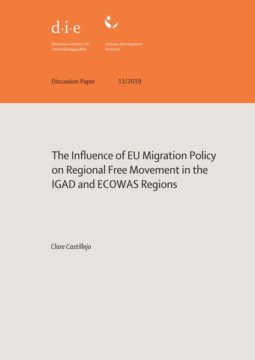Establishing free movement regimes is an ambition for most African regional economic communities, and such regimes are widely understood as important for regional integration, growth and development. However, in recent years the EU’s migration policies and priorities in Africa – which are narrowly focused on stemming irregular migration to Europe – appear to be in tension with African ambitions for free movement.
This paper examines how the EU’s current political engagement and programming on migration in Africa is impacting on African ambitions to establish free movement regimes. It focuses first on the continental level, and then looks in-depth at two regional economic communities: The Intergovernmental Authority on Development (IGAD) in the Horn of Africa, and the Economic Community of West African States (ECOWAS).
The paper begins by examining how free movement has featured within both EU and African migration agendas in recent years, describing how this issue has been increasingly sidelined within the EU’s migration policy framework, while receiving growing attention by the African Union. The paper then discusses the impact of EU migration policies and programmes on progress towards regional free movement in the IGAD region. It finds that the EU is broadly supportive of efforts to establish an IGAD free movement regime, although in practice gives this little priority in comparison with other migration issues.
The paper goes on to examine the EU’s engagement in the ECOWAS region, which is strongly focused on preventing irregular migration and returning irregular migrants. It asks whether there is an innate tension between this EU agenda and the ambitions of ECOWAS to fully realise its existing free movement regime, and argues that the EU’s current engagement in West Africa is actively undermining free movement.
Finally, the paper discusses the differences between the EU’s approach to migration and free movement in these two regions. It offers recommendations regarding how the EU can strengthen its support for free movement in both these regions, as well as more broadly in Africa.
- Veröffentlicht am Freitag 19. Dezember 2025 von Deutsches Institut f. Entwicklungspolitik
- ISBN: 9783960211013
- 47 Seiten
- Genre: Gesellschaft, Politik, Sachbücher, Wirtschaft
